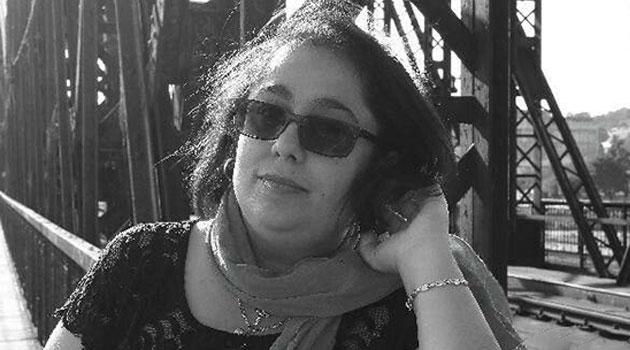Anna Chválová, candidate for the Czech lower house: Romani candidates have the same chance as all others, it's not a disadvantage

News server Romea.cz is publishing interviews with each Romani candidate competing for a seat this year in the Chamber of Deputies of the Parliament of the Czech Republic. Today our interview is with Anna Chválová, assistant to the Vice-Mayor of Prague 4 and coordinator of a project for integrating foreign nationals in Prague 5 who is running in Prague for the Green Party (Strana zelených – SZ) in 32nd place on the candidate list.
Q: What makes the SZ different from other political parties? Does it offer something they do not?
A: The Green Party is built on three pillars that are close to my heart. We are the only political party thinking about all target groups. We mainly focus on families with young children, women, senior citizens, the environment and housing. Compared to other parties we have actively advocated for a cleaner environment, which is the second pillar of our program.
Q: Let’s talk about the SZ electoral program. What are you personally bringing with you into politics?
A: In March 2017 I was elected to the Council of the Founding Organization of the Green Party cell in Prague 5. I only joined recently and I am mainly interested in the subjects I care most about, affordable housing and social housing. Actually, housing affects all of us, and it interferes with the lives of individual families to a great degree. For that reason I was, one year ago, part of the assessment commission for social housing in Prague 5 and I have been involved with a Working Group that produced an analysis of social housing. I have long been involved with community work and social work, I frequently collaborate with nonprofits, and I take an active intrest in supporting inclusive and special education as well as ecology.
Q: Social housing is one part of your electoral program – how do you personally explain that we are still not managing to significantly improve conditions in the areas where socially vulnerable citizens live?
A: It is a pity that the effort to introduce a law on social housing by the end of the current administration ultimately bore no fruit. However, this is all about political will. That law has become a set of mere recommendations. Municipalities that want to address the situations of citizens who cannot afford rental housing or who do not qualify for a mortgage ultimately will begin to do so on their own. The law on social housing was meant to be designed primarily as an instrument for dealing with municipalities who do not much want to address this, though.
Q: Let’s stick with housing for a moment. The Green Party is advocating for senior citizens to receive dignified incomes and to be able to live out their lives in their own apartments. How?
A: Senior citizens and housing is a broad topic in and of itself. Many senior citizens live in apartments that they would like to spend the rest of their lives in, but they are unable to afford them. Senior citizens should have a guarantee of living to the end of their lives in their own apartments, the state could, above and beyond their pensions, cover a monthly payment for their apartment rental until they die. In my opinion, certainly in such a case that would also be an aid to those municipal departments where senior citizens are occupying larger apartments that they could then exchange for smaller ones, ideally for the ones where young families are now residing and where the exchange would not be a problem. The young family would acquire housing more adequate to their needs, and senior citizens would manage to live in their own housing without financial problems for the rest of their lives. Another variant is shared housing. There are many senior citizens who live alone and who feel abandoned. They could live together with a young family and they could mutually aid each other. The state, i.e., its individual units in each town, would assist them with finding an appropriate family to exchange with or to help.
Q: As a party you distinguish yourself by your openness to all groups, whether they are senior citizens or women, and there is no doubt that your electoral program aims at them, but you are also targeting the LGBT community, which the party has long supported.
A: That is true. The Greens think about all target groups, including LGBT people. I do not personally have a problem with that, it’s just that the subject of women is closer to my heart because I am a woman and I have long taken an interest in the topics of gender and the position of Romani women in society.
Q: Where, in your opinion, does citizens’ low trust in politicians come from?
A: People are already overwhelmed by and sick of electoral promises. It always makes me smile when suddenly, out of nowhere, right before the elections, I hear from the mouths of political movement or party leaders that Romani people are parasites who abuse welfare. I have worked for the Labor Office and I know what the conditions and rules are that govern the awarding of benefits, and I can say that it really is not the case that just anybody qualifies. To make a long story short, people no longer believe their lives will improve, that is why they do not vote. However, it is necessary to realize that each town is different, the individual regions grapple with different problems, some people are facing high unemployment rates, others a lack of doctors locally, etc. In Prague the situation is just a bit different, there is simply more on offer here, after all, whether that has to do, for example, with the area of the labor market or of medical care – but even so, that is no reason not to vote.
Q: Why should voters cast their ballots for a Romani candidate in particular?
A: Whether somebody is or is not Romani is not the point. I am, for example, in 32nd place on the candidate list, and to some people that migh mean I am unelectable, but I am mainly doing this to win votes for the party that I’m running for.
Q: Fine, but are Romani people on candidate lists at all electable if most of them never make it into the top 10?
A: This year four Romani candidates are running for the Green Party, and that is brilliant. Martin Bajger from Trmice is certainly the right person in the right place, he has pushed through a great deal locally in the area of employment. Karel Karika is already the mayor of the Předlice municipal department and David Tišer is an activist who mainly works in the arts and who has long advocated for the interests of the LGBT community. In short, these are people who certainly have something to offer the voters. For me personally being a candidate is symbolic, because as I mentioned, I am in 32nd place. I have long supported the Greens, as have all those who are on the list ahead of me. Because many people know me, I hear from time to time, that if I were to be seated in Parliament, or if next year, after the local elections, I were to be seated in the city council, then I would perform that political role honestly. I even hear from those determined non-voters that while they do not love politicians, they would trust me. I also get a great deal of support through online social networks, where I frequently get questions from people asking how they can support me even if they do not vote in Prague. I explain to them that they do not have to directly support me, but they can support the Green Party per se. That is important to me. Personally, I am glad I was appointed to the Council of the Founding Organization [of the local cell] because that is essential to me, I can decide about the place I live and that I know well. For me, that is already success. Romani candidates have the same chances as all the rest, though, they are certainly not disadvantaged somehow. It is good to realize, however, that even if they do not get elected the first time, that need not deter them from politics in future, because they can continue their work. This is also about Romani candidates identifying with the opinions of the party they are running for and actively contributing to society-wide issues. I, for example, am interested in Romani people because I am a Romani woman, but I am also interested in young families, single mothers, and women generally. I am interested as well in common subjects like the environment or senior citizens because I used to work on the issue of caregivers’ welfare benefits, support for mobility, etc. Senior citizens are another target group that should decidedly not be forgotten about.
Q: The Green Party may be the only party with four Romani candidates.
A: That is true, but many Romani people have no interest in entering politics because, to be brief, they are already disgusted with it and they are addressing other issues on a daily basis anyway, like their personal employment, financing and housing. Any politician is a person who probably spends the least amount of time on such private considerations. Personally I do not know whether the TOP 09 party, for example, would refuse to put a politically active Romani person on their candidate list – Dominik Feri is running for TOP 09 in 36th place, and he is also getting the most votes in the polls. I am certain, though, that nobody Romani would want to run, for example, for Tomio Okamura’s movement – and they wouldn’t even accept a Romani person as a candidate or member. This is all about whether a person wants to do something for society. If somebody wants to go into politics, he or she must be aware of what an enormous responsibility it is.
Q: What would you consider to be a success in these parliamentary elections?
A: Certainly if we [the Green Party] were to achieve at least 5 % of the vote. It would be a success if people got into the Chamber of Deputies who would advocate for the interests of all people, not just engage in politics to benefit the rich or their so-called VIP clientele.
